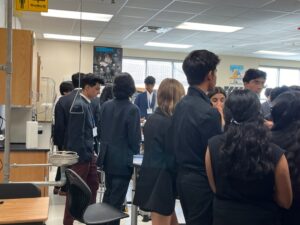Brief Guide on Country Assignments and Committees
Jesuit Model United Nations Contestants
At this years conference, Jesuit sent five delegates to compete to be the most distinguished delegate in their respective committees. Through research, preparation, and debate, in and outside community time, these delegates tackled the geopolitical intricacies of solving this global issues while representing their own nations interests.
These delegates were: Wills Blosser ’26, Adam Peckham ’26, Shayan Gill ’26, Hassan Gill ’26, and finally Kobus Williams 28′. Each member is assigned their own nation as well as being assigned to their own committee, which specializes on individual topics that nations have to solve.
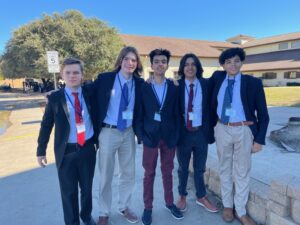
Wills Blosser ’26 was assigned to the World Health Organization as Russia, having the topic: the issue of healthcare for displaced populations. Adam Peckham ’26 was Guatemala in the General Assembly, tackling the issues of global hunger. Shayan and Hassan Gill were actually in the Arab League together representing the nation of Kuwait. And finally, Kobus Williams ’28 represented Vietnam in the Economic and Social Council regarding the issue of human trafficking. This is the second time Adam Peckham and Wills Blosser have attended this competition, while the other delegates had the opportunity to experience it for the first time.
Preparing for the Competition
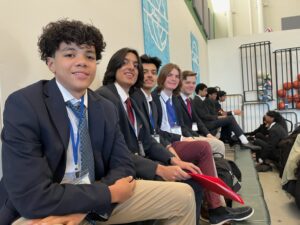
Gaining Insight on the Competition Experience
Model United Nation club members came up with questions for Adam Peckham 26′ to ask Wills Blosser’s 26′ in order to gain insight on the challenges, highlights, and key takeaways from participating in one of the most competitive Model United Nation conferences in the region.
The Interview
Hello, Wills. I want to first ask you about your preparation for this event. How much time did you spend? What were some challenges?
“Hello, well to begin with, I was assigned the nation of Russia in the World Health Organization with the topic of granting healthcare to migrants. To adequately prepare for this event, I had to, of course, research Russia’s opinion on this matter. Doing this required some digging on the internet, but there are plenty of resources to pull from, including DAMUN which provides context for the issue and much more. Then, using this knowledge I had to make a 1 paged position paper which I did with some of my other colleagues during community time, after school meetings on somedays, and at home sometimes. Overall, the greatest challenge was just finding the time to do it, but it was interesting nonetheless.”
When did this competition start? What was the first step taken upon arrival?
“So all delegates were required to arrive at the competition at 8:00 AM, which was a tad early for me. But, we did not immediately start with debate sessions. Rather, all the delegates were gathered into a single auditorium where we listened to a guest speaker. And, oh my there were a lot of delegates that day, I would say more than last year. Anyways, the guest speaker shared how our very participation in this competition displays our leadership and how we can make a difference in the future. After that empowering speech, the student chairs in charge of DAMUN began to dismiss delegates to their groups beginning the competition.
What happened Next? Where were you moved? What was your committee like?
“Once we were gathered, we were walked to our respective rooms for our committees. I was in a pretty large group for somewhat of a smaller committee. There were like 50+ delegates, which was surprising. And, I knew many of them from my prior competitions which quickly quelled all nervousness. But anyways, we were moved to a pretty large classroom, but it was pretty cramp due to the sheer amount of delegates. I do not think they accounted for that many. ”
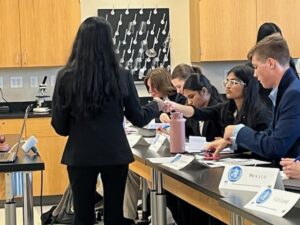
How did your session start off? Did you do well? Did others? What was the general atmosphere?
“Well, because there were so many delegates, the attendance, which was where nations decided whether or not they were present and voting, took ages. I believe it was like an hour. After that, we began with opening statements and each delegate was allotted 30 seconds to make their argument. Many delegates did a great job, especially the delegate of Finland, who gave a really compelling argument. I also spoke and got my point across, and because of was a major nation, many of the smaller nations sent me notes saying they support my plan.”
“The note system in model UN is a cool element that allows for quick communication during the long speaking periods. And, in our room there were so many notes that the moderators banned it for a couple minutes so the note passer can catch up. The general atmosphere was very easy going and I had a great time, making new friends and reconnecting with old ones”
How did the conference progress? Did you face any challenges?
“After the opening statements, one of many nations motioned for a moderated caucus of 20 minutes with a speaking time of 1 minute. To get this motion passed, half of all the delegates in the room had to agree. And, this one in particular was passed with ease. A moderated caucus is a more formal speaking section of Model UN, composing of individual delegates speaking more in depth about the topic at hand. Each delegate, like in the opening statements, has an allotted time, in this case a minute to respond to many of the opening statements presented. I was fortunate to be near the top of the speakers list and responded to some who had different plans for the crisis than I did. And, of course, I received a ton of notes from other nations reacting to my speech, which allowed me to form key alliances with others.”
“Now, you might be wondering because there are so man delegates and only a 20 minute total speaking time, how might all the delegates speak in time? Well, immediately after the 20 minutes, several delegates motioned for an extension. Many who already spoke, not including me, voted to deny this motion so that their points of views could be monopolized. But, those were only a few, and the motion passed adding another 20 minutes.”
Did you have any breaks? Time to socialize?
“Yes, we had every hour or so some 15 minute snack and socializing breaks which allowed me to rest up and as well as talk about something other than politics to the other delegates. Also, At 12:30 PM we had lunch which was a ton of pizza. During that time, I had the opportunity to talk with my fellow Jesuit delegates and ask how their days were going. And believe me, I was ready for those breaks because while fun, this process can be exhausting for sure.”
How did the rest of the conference play out?
“As the day progressed, and as we finished moderated caucus’ and had a good understanding of everyone else’s opinion, we moved towards drafting resolutions and conversing to other delegates through unmoderated caucus’s. These caucus’s were a lot more free, allowing delegates to walk around and freely converse to whomever the want. And during this time, I formed a coalition with several other nations who had similar views to me and drafted a resolution.”
“Resolutions are formed by several nations to be presented to the other nations to be voted upon, providing a solution to the given problem at hand. After finishing up making my groups resolution, we presented it to the other delegates, reading from it and answering important questions. In the end, my groups resolution was passed, which was truly an awesome moment as I could now sigh in relief and finally relax.”
How did the conference end? What were your biggest takeaways?
“Overall, this competition was a fantastic experience and I do think I really grew as a delegate this time. I also had the chance to really demonstrate my developing skills to the other delegates, leaving quite the favorable impression. Sadly, however, no Jesuit delegates received awards for their hard work. But, we still learned a ton of key tips and methods to be a successful delegate in future competitions. And to me, that is what matters most”
A True Learning Experience
For Jesuit’s Model United Nations team, DAMUN was more than just a competition; it was an opportunity to engage in meaningful conversations about the challenges facing the world today. Through rigorous debate and teamwork, students honed their public speaking, critical thinking, and problem-solving skills, valuable traits that will serve them well both in and out of the conference room.
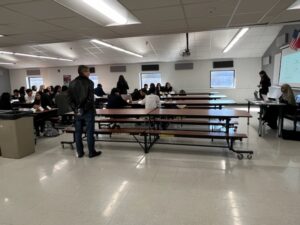
As the conference concluded, Jesuit’s delegates walked away with invaluable experience and a deeper appreciation for the art of diplomacy. DAMUN 2024 reaffirmed the team’s commitment to understanding and addressing global issues, and Jesuit is already looking forward to future conferences.
Stay tuned for more updates on the Jesuit Model UN team as they continue to make an impact on the world stage!
And as always,
GO RANGERS!

